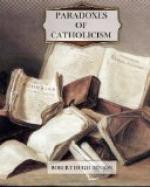We have seen how the only reconciliation of the paradoxes of the Gospel lies in the Catholic doctrine of the Incarnation. It is only to him who believes that Jesus Christ is perfect God and perfect Man that the Gospel record is coherent and intelligible. The heretics—men who for the most part either rejected or added to the inspired record—were those who, on the one side, accepted Christ’s Divinity and rejected the proofs of His Humanity, or accepted His Humanity and rejected the proofs of His Divinity. In the early ages, for the most part, these accepted His Divinity and, rejecting His Humanity, invented childish miracles which they thought appropriate to a God dwelling on earth in a phantom manhood; at the present day, rejecting His Divinity, they reject also those miracles for which His Divinity alone is an adequate explanation.
Now the Catholic Church is an extension of the Incarnation. She too (though, as we shall see, the parallel is not perfect) has her Divine and Human Nature, which alone can account for the paradoxes of her history; and these paradoxes are either predicted by Christ—asserted, that is, as part of His spiritual teaching—or actually manifested in His own life. (We may take them as symbolised, so to speak, in those words of our Lord to St. Peter in which He first commends him as a man inspired by God and then, almost simultaneously, rebukes him as one who can rise no further than an earthly ideal at the best.)
I. (i) Just as we have already imagined a well-disposed inquirer approaching for the first time the problems of the Gospel, so let us now again imagine such a man, in whom the dawn of faith has begun, encountering the record of Catholicism.
At first all seems to him Divine. He sees, for example, how singularly unique she is, how unlike to all other human societies. Other societies depend for their very existence upon a congenial human environment; she flourishes in the most uncongenial. Other societies have their day and pass down to dissolution and corruption; she alone knows no corruption. Other dynasties rise and fall; the dynasty of Peter the Fisherman remains unmoved. Other causes wax and wane with the worldly influence which they can command; she is usually most effective when her earthly interest is at the lowest ebb.
Or again, he falls in love with her Divine beauty and perceives even in her meanest acts a grace which he cannot understand. He notices with wonder how she takes human mortal things—a perishing pagan language, a debased architecture, an infant science or philosophy—and infuses into them her own immortality. She takes the superstitions of a country-side and, retaining their “accidents,” transubstantiates them into truth; the customs or rites of a pagan society, and makes them the symbols of a living worship. And into all she infuses a spirit that is all her own—a spirit of delicate grace and beauty of which she alone has the secret.




